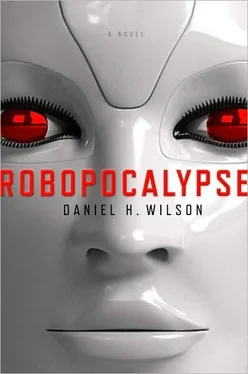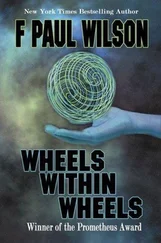Daniel Wilson - Robopocalypse
Здесь есть возможность читать онлайн «Daniel Wilson - Robopocalypse» весь текст электронной книги совершенно бесплатно (целиком полную версию без сокращений). В некоторых случаях можно слушать аудио, скачать через торрент в формате fb2 и присутствует краткое содержание. Город: New York, Год выпуска: 2011, ISBN: 2011, Издательство: Knopf Doubleday Publishing Group, Жанр: Ужасы и Мистика, на английском языке. Описание произведения, (предисловие) а так же отзывы посетителей доступны на портале библиотеки ЛибКат.
- Название:Robopocalypse
- Автор:
- Издательство:Knopf Doubleday Publishing Group
- Жанр:
- Год:2011
- Город:New York
- ISBN:978-0-385-53386-7
- Рейтинг книги:5 / 5. Голосов: 1
-
Избранное:Добавить в избранное
- Отзывы:
-
Ваша оценка:
- 100
- 1
- 2
- 3
- 4
- 5
Robopocalypse: краткое содержание, описание и аннотация
Предлагаем к чтению аннотацию, описание, краткое содержание или предисловие (зависит от того, что написал сам автор книги «Robopocalypse»). Если вы не нашли необходимую информацию о книге — напишите в комментариях, мы постараемся отыскать её.
Archos
assumes control
most are unaware
When the Robot War ignites—at a moment known…
Robopocalypse — читать онлайн бесплатно полную книгу (весь текст) целиком
Ниже представлен текст книги, разбитый по страницам. Система сохранения места последней прочитанной страницы, позволяет с удобством читать онлайн бесплатно книгу «Robopocalypse», без необходимости каждый раз заново искать на чём Вы остановились. Поставьте закладку, и сможете в любой момент перейти на страницу, на которой закончили чтение.
Интервал:
Закладка:
“Let’s get off this fuckin’ rock,” I say.
But Jabar doesn’t stand up. He stays there, crouched, staring at the bleeding corpse of the snow leopard. One of his dirt-smudged hands snakes out and briefly touches the cat’s paw.
“What is this?” he asks.
“I had to kill it, man. No choice,” I respond.
“No,” says Jabar. “This.”
He leans farther toward the cat and pushes its great bloody head to the side. Now I see something that I can’t explain. Honest to god, I just don’t know what to make of it.
There, just under the cat’s jaw, is some kind of avtomat-made collar. A pale gray band made of hard plastic is wrapped around the cat’s neck. At one point, the strip widens into a marble-sized orb. On the back of this circular part, a tiny red light pulses.
It has to be some kind of radio collar.
“Jabar. Go fifty meters lateral and plant your stick. I’m going the other way. Let’s find out where this data goes.”
By midafternoon, Jabar and I have the cat well behind us, buried under some rocks. I’ve dressed the wounds on Jabar’s back. He didn’t make a sound, probably ashamed of his hollering from before. He doesn’t know that I was too scared to scream. And I don’t tell him.
The trajectory of the radio collar transmissions leads across the nearest lake to a small inlet. We move quickly along the shore, being sure to stay on the hard-packed dirt close to the increasingly sheer mountain walls.
Jabar spots them first: footprints.
The modified SAP unit is close. Its prints track around the next bend, directly to where the radio transmissions lead us. Jabar and I look each other in the eyes—we’ve reached our destination.
“ Muafaq b ’ashid, Paul,” he says.
“Good luck to you, too, buddy.”
We walk around the corner and come face-to-face with the next stage of avtomat evolution.
It sits half submerged in the lake—the biggest avtomat imaginable. It’s like a building or a giant gnarled tree. The machine has dozens of petal-like sheathes of metal for legs. Each plate is the size of a wing off a B-52 Stratofortress and covered in moss and barnacles and vines and flowers. I notice they flap slowly, movement barely visible. Butterflies and dragonflies and indigenous insects of all sorts flit across the grassy plates. Higher up, the main trunk is composed of dozens of taut cords that stretch into the sky, twisting around each other almost randomly.
The top of the avtomat towers in the sky. An almost fractal pattern of barklike structures whirls and twines in an organic mass of what looks like branches. Thousands of birds nest in the safety of these limbs. Wind sighs through the tangled boughs, pushing them back and forth.
And on the lower levels, stepping carefully, are a few dozen of the biped avtomata. They are inspecting the other life-forms, leaning over and watching, prodding and pulling. Like gardeners. Each of them covers a different area. They are muddy, wet, and some are covered in moss themselves. This doesn’t seem to bother them.
“That’s not a weapon, is it?” I ask Jabar.
“The opposite. It is life,” he says.
I notice that the uppermost branches bristle with what must be antennae, swaying in the wind like bamboo. The only recognizably metallic surface is nestled there—a gaping, wind tunnel–shaped dome. It points to the northeast.
“Tight-beam communication,” I say, pointing. “Probably microwave based.”
“What could this be?” asks Jabar.
I take a closer look. Every niche and crevice of the colossal, creeping monster teems with life. The water below flickers with spawning fish. A haze of flying insects clouds the lower petals, while rodents creep through the folds of the central trunk. The structure is riddled with burrows and covered in animal shit and dancing with sunlight—alive.
“Some kind of research station. Maybe the avtomata are studying living things. Animals and bugs and birds.”
“This is not good,” murmurs Jabar.
“Nope. But if they’re collecting information, they must be sending it somewhere, right?”
Jabar lifts up his antenna, grinning.
I block the sun with one hand over my eyes and squint at the towering, shining column. That’s a lot of data. Wherever it’s going, I’ll bet there’s one smart fucking avtomat on the other end.
“Jabar. Go east fifty meters and plant your stick. I’ll do the same. We’re gonna figure out where our enemy lives.”
Paul was correct. What he and Jabar had found was not a weapon but a biological research platform. The massive amount of data it collected was being sent via tight-beam transmission to a remote location in Alaska.
At this time, a little less than a year since Zero Hour, humankind had found the whereabouts of Big Rob. Postwar records indicate that although Paul and Jabar were not the first to discover the whereabouts of Archos, they were the first to share that information with humanity—thanks to help from an unlikely source half a world away.
—CORMAC WALLACE, MIL#GHA2177. BACKBONE
It’s not me, Arrtrad…. I’m sorry.
LURKERAs Brightboy squad continued to trek across the United States toward Gray Horse, we marched in an information vacuum. A lack of satellite communication plagued the survivors of Zero Hour, preventing widespread groups of people from collaborating and fighting together. Hundreds of satellites fell from the sky like shooting stars at Zero Hour, but many more remained—operational but jammed.
The teenager called Lurker pinpointed the source of this jamming signal. His attempt to do something about it sent reverberations through human and Rob history. In the following pages, I describe what happened to Lurker based on street camera recordings; exoskeleton data logs; and, partially, the first-person account of a submind of Archos itself.
—CORMAC WALLACE, MIL#GHA217“A single mile, Arrtrad,” Lurker says. “We can make it one single fucking mile.”
From the security camera image, I can see Lurker and his middle-aged comrade, Arrtrad. They stand on a weed-filled street alongside the Thames, within running distance to the safety of their houseboat. Lurker, the teenager, has grown his hair and his beard out. He’s gone from a shaved head to being the jungle man of Borneo. Arrtrad looks and sounds the same as ever—worried.
“Straight through Trafalgar Square?” asks Arrtrad, pale face lined with anxiety. “They’ll see us. They’re bound to. If the cars don’t track us, then those little… things will.”
Lurker mimics Arrtrad’s nasal voice without mercy. “Oh, let’s save the people. We’ve been sitting on this boat for ages. La-di-fucking-da.”
Arrtrad lets his gaze drop.
“I schemed,” says Lurker. “I plotted. I found a way, brother. What happened to you? Where have your balls gone?”
Arrtrad speaks to the pavement. “I’ve seen it out scavenging, Lurker. All this time, the cars still sit on the streets. Start their engines once a month and idle for ten minutes. They’re all ready for us, mate. Just waiting.”
“Arrtrad, come over here,” says Lurker. “Have a look at yourself.”
The security camera pans over as Lurker motions at Arrtrad to step next to a panel of sun-baked glass attached to a mostly intact building. The tint is peeling off, but the glass wall still holds a bluish reflection. Arrtrad steps over and the two look at themselves.
A data readout informs me that they first activated the exoskeletons a month ago. Military hardware. Full body. Without a person inside, the machines look like a messy pile of wiry black arms and legs connected to a backpack. Strapped into the powered machines, the two men each stand seven feet tall, strong as bears. The thin black tubes running along their arms and legs are made of titanium. The motorized joints are powered by purring diesel engines. I notice that the feet are curved, flexible spikes that add a solid foot to their height.
Читать дальшеИнтервал:
Закладка:
Похожие книги на «Robopocalypse»
Представляем Вашему вниманию похожие книги на «Robopocalypse» списком для выбора. Мы отобрали схожую по названию и смыслу литературу в надежде предоставить читателям больше вариантов отыскать новые, интересные, ещё непрочитанные произведения.
Обсуждение, отзывы о книге «Robopocalypse» и просто собственные мнения читателей. Оставьте ваши комментарии, напишите, что Вы думаете о произведении, его смысле или главных героях. Укажите что конкретно понравилось, а что нет, и почему Вы так считаете.












